Hannah M. Alarian’s research focuses on the comparative politics of belonging. It specifically addresses topics of citizenship, immigrant incorporation, prejudice, and far-right politics in democracies globally, with a primary focus on those in West and Central Europe. Below is a selection of her recent publications and a selection of her current works in progress.
Book Manuscript
Voters without Citizenship: Immigrant Voting Rights and Citizenship in Europe
Abstract ↓
In democratic societies, citizenship is often a prerequisite for voting. Citizenship establishes the boundaries of the political community and democracies empower those community members to select their representatives and leaders. Although this relationship between political status and participation seems definitional, over fifty countries globally have severed the two- removing citizenship as a requirement for voting rights. This division is particularly surprising in Europe, where political parties and public opinion would suggest such policies would be unlikely to be adopted or implemented.
This book explores the downstream impact of separating democratic participation from membership. Spanning over half a century of immigrant voting rights legislation across Europe, this book provides a comprehensive examination of immigrant electoral rights. Rather than degrade the concept and meaning of citizenship, I argue that immigrant suffrage strengthens citizenship.
Triangulating across a variety of multi-methodological sources including parliamentary speeches, interviews, cross-sectional administrative data, and surveys across the EU, this book finds immigrant enfranchisement raises and delivers expectations of immigrant acceptance in society. This book consequently broadens our understanding of political value of state interactions; communicating to immigrants the boundaries and expectations of inclusion and exclusion.
Articles in Refereed Journals
11. Tear down this (fire)wall? How Uncertainty surrounding the cordon sanitaire affected Attitudes in Germany's 2025 Election (with J. Fahey). Forthcoming. German Politics & Society.
OSF. Abstract ↓

Traditional European parties face a dilemma: choosing to accommodate or exclude far-right parties in policy and coalition formation. Although breaking a cordon sanitaire may counter far-right appeals, it could also legitimize the party and increase its voter base. We test these competing expectations during the 2025 German Federal election, strategically varying whether the presumptive coalition leader (the CDU/CSU) is portrayed as breaching or preserving the Brandmauer (firewall) against the far-right AfD. We find that neither accommodation nor exclusion of the far-right affects German voter party approval, democratic satisfaction, vote choice, or immigration attitudes. These findings suggest that party strategies toward the cordon sanitaire may have limited influence on voters, providing implications for the efficacy of the firewall as a standalone defense against the far-right.
10. Local Suffrage increases Citizenship Acquisition: Evidence from the European Union. 2025. Journal of Politics.
Online First. Abstract ↓
⚬ Covered in:
• University of Florida College of Liberal Arts and Sciences (CLAS) News
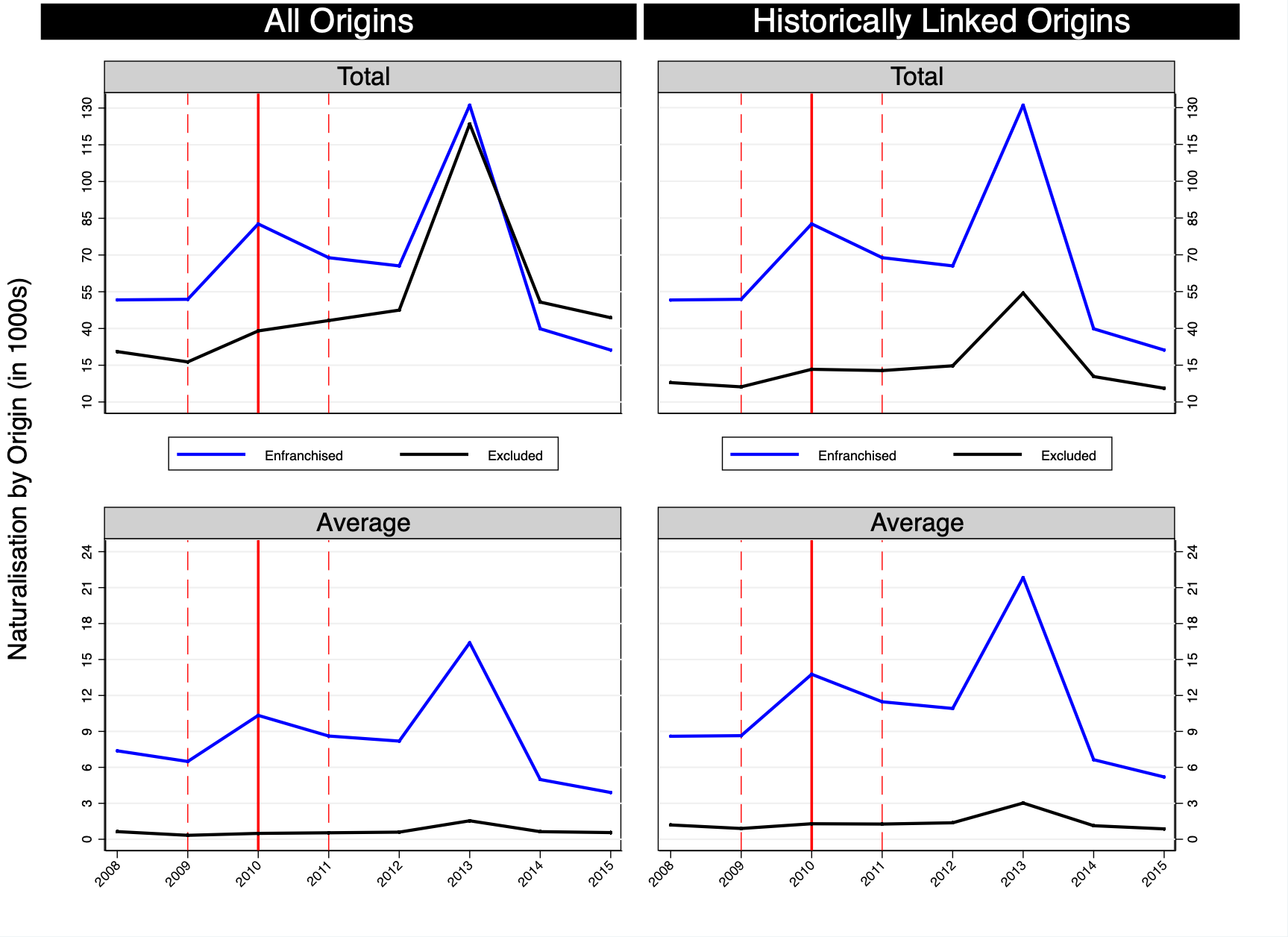
How does local non-citizen enfranchisement affect citizenship? Although some contend suffrage reduces naturalization by removing a key benefit of citizenship, I posit that early suffrage encourages rather than deters naturalization. I test this theory in a quantitative case study and multiple cross-national analyses within the European Union. First, I exploit origin-specific variation in access to Spain’s 2011 municipal elections to estimate the effect of non-EU suffrage on naturalization. Next, I explore this relationship beyond Spain, using bilateral OECD naturalization figures among 22 EU destinations and 131 non-EU origins between 2007 and 2014. Across each analysis, I find local voting rights increase formal membership. I further reveal these patterns are not present for other forms of immigrant political rights and are associated with increased immigrant identification with one's state. Together these findings challenge cost-benefit approaches to national membership, revealing local suffrage reinforces rather than degrades citizenship.
9. Conditional Enfranchisement: How Partisanship Determines Support for Noncitizen Voting Rights. (with S. Zonszein). 2024. American Political Science Review.
Open Access Article Link. Pre-analysis Plan. Abstract ↓
⚬ Covered in:
• Migration Policy Institute (MPI) Feature Article
• University of Florida News
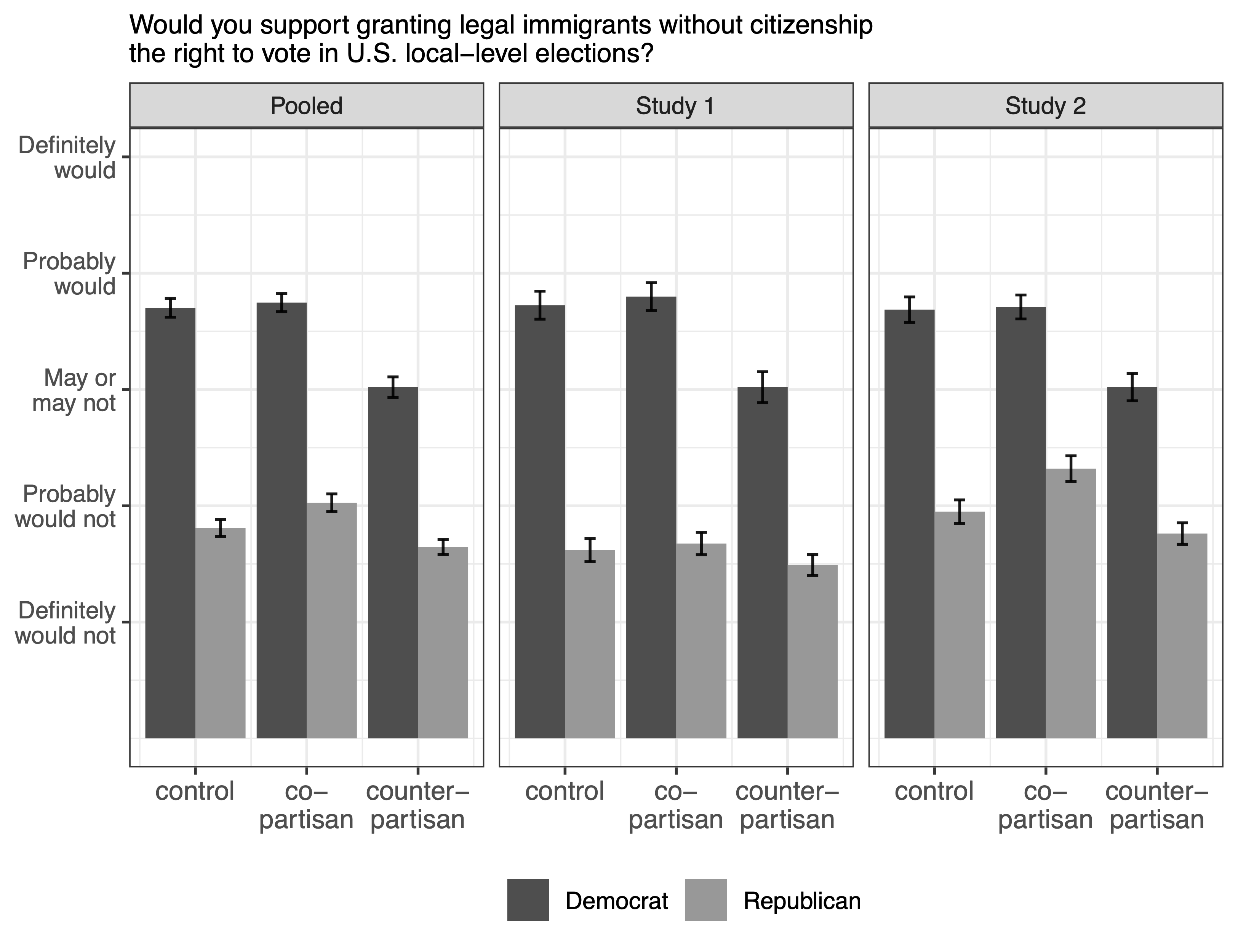
Expanding suffrage presents a critical question about the stability and legitimacy of liberal democracies. In the U.S., noncitizen residents are the latest focus of such (re)enfranchising efforts. Public opinion plays a significant role in the passage of legislation expanding or restricting noncitizen access to local elections. Although elite support for noncitizen suffrage is well-documented, little is known about public opinion toward such noncitizen voter policies. What accounts for voter support for noncitizen electoral participation? We argue that the partisan alignment between noncitizens and U.S. voters is critical for determining U.S. voters' support for noncitizen voting rights. Evidence from two survey experiments suggests that U.S. voters are pragmatic in their enfranchising preferences: voters increase their support for co-partisan enfranchisement but oppose this same policy when considering out-partisans. These dynamics are present among both Republicans and Democrats, underscoring the societal implications of heightened partisanship on American democracy.
8. The Enduring Effect of Immigration Attitudes on Vote Choice: Evidence from the 2021 German Federal Election. 2022. German Politics & Society.
Article Link. Publisher Version. Abstract↓
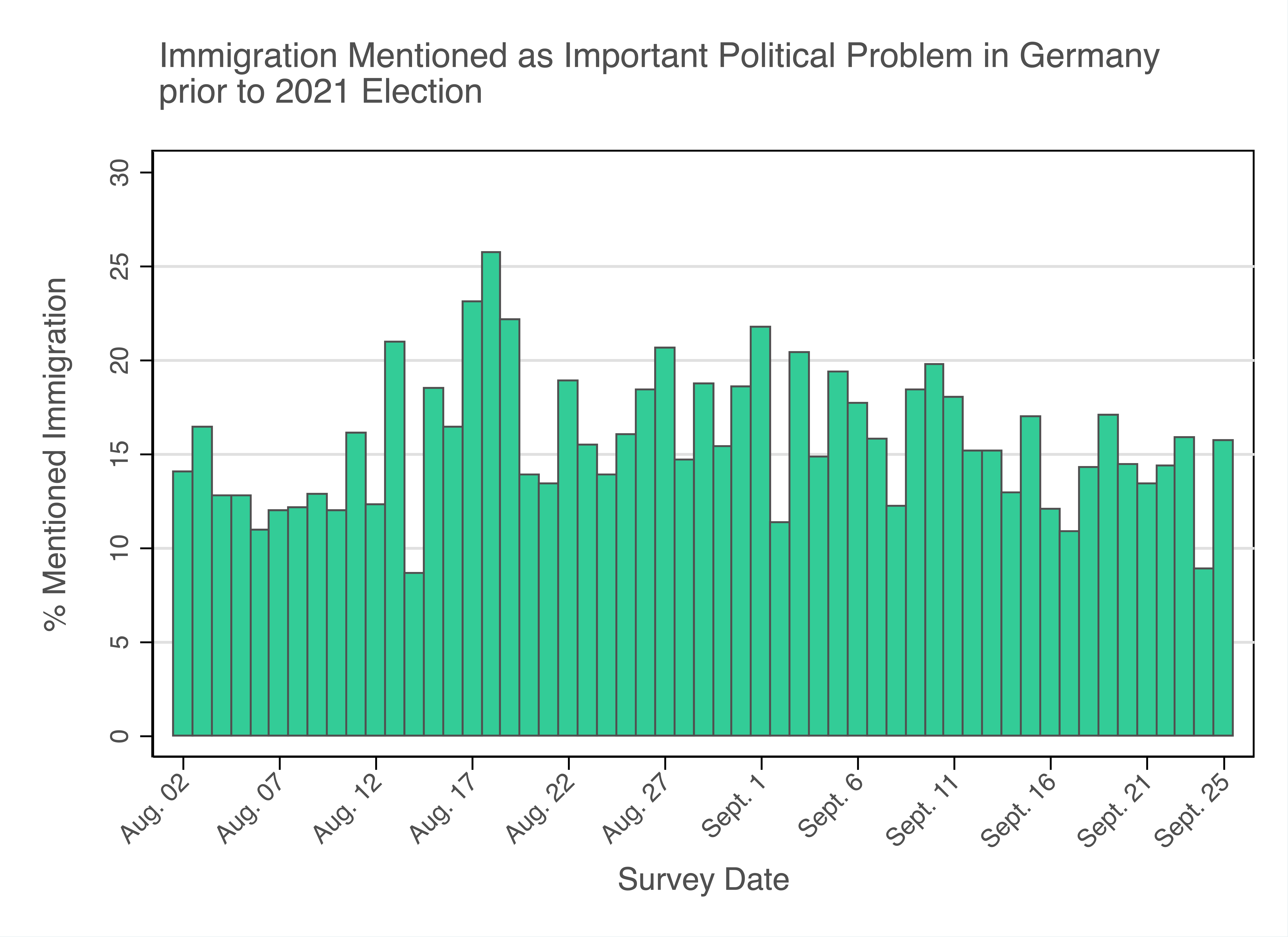
Immigration attitudes have long been critical in predicting electoral behavior in Western Europe. Whether such attitudes still motivate political behavior in the current pandemic environment is yet to be seen. This article addresses this topic, exploring immigration’s prevalence and impact throughout Germany’s 2021 Bundestag election. Combining evidence across multiple German election surveys, I find immigration remains consequential in shaping German political behavior throughout the country. In spite of immigration’s reduced political salience, voters continued to view immigration as one of the most important political problems facing Germany. Moreover, immigration-minded voters were significantly more likely to support the Alternative for Germany on the far-right and punish the Greens on the left. This article hence concludes that reducing immigration’s salience will not necessarily change its influence over modern German elections.
7. When Populists Win: How Populist Success affects Democratic Attitudes in Germany and the UK (with J. Fahey & T. Allen) 2022. Electoral Studies.
Article Link. Abstract ↓
⚬ Covered in:
•UK in a Changing Europe (UKICE) Commentary.
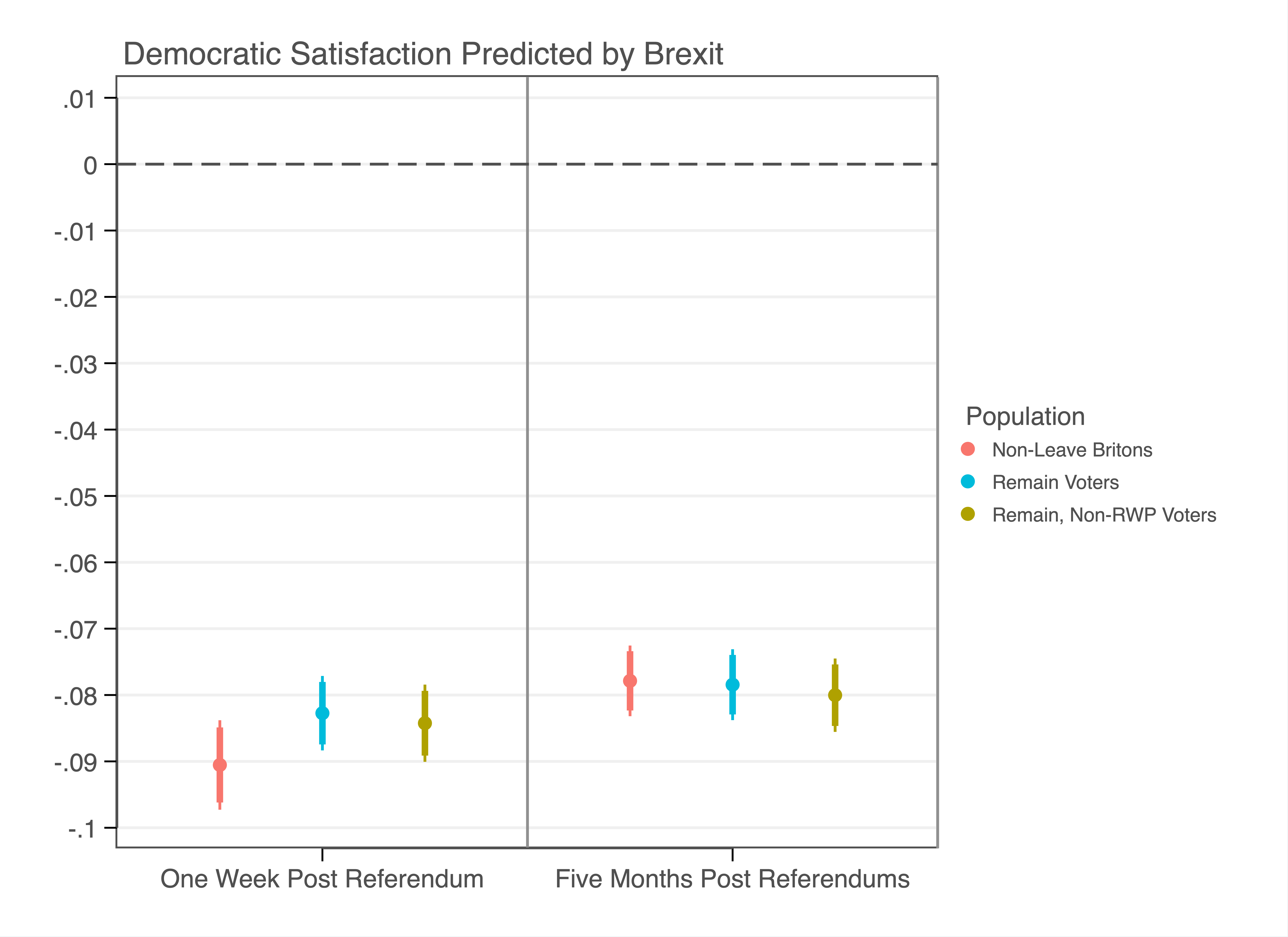
Right-wing populists have emerged and endured in democracies globally, threatening democracy through their attacks on liberal institutions. Beyond these proximate threats, relatively little is known about how right-wing populists impact public opinion. This article addresses this gap, exploring change in democratic satisfaction among non-populist voters in two recent elections with right-wing populist success: the 2016 Brexit referendum in the U.K. and the 2017 election of the far-right, populist Alternative für Deutschland in Germany. Leveraging high quality panel data, we reveal democratic satisfaction among the mainstream electorate declines after right-wing populists win. Conversely right-wing populist voters appear to be no more or less satisfied in democracy regardless of the election outcome. In addition, we find mainstream variation in democratic satisfaction is not due to a election loss generally, but right-wing populist success specifically. These findings hence demonstrate the threat that right-wing populism poses to democratic support even among its opponents.
6. Field Experiments in the Global South: Assessing Risks, Localizing Benefits, and Addressing Positionality (with E. Herman, A. Panin, E. Wellman, G. Blair, L. Pruett, K.O. Opalo, A. Grossman, Y. Tann, A. Dyzenhaus, & N. Owsley). 2022. PS: Political Science & Politics.
Article Link. Abstract ↓
We pose a set of questions that we suggest researchers should ask themselves before running field experiments in the Global South. The focus is on honest appraisals of the costs and benefits of the research and on whom those costs fall and benefits accrue. We consider four stages of the research process: idea generation (where do the ideas come from), planning (who is involved and whose voices are included), implementation (who is at risk and who bears costs), and scientific communication to policymakers and the public (who benefits and how is sustainability built into planning). We discuss these stages and suggest best practices by researchers, academic advisors, and journal reviewers when executing or evaluating experimental research using material from the Global South.
5. Cause or Consequence? The AfD and Attitudes toward Migration Policy. 2021.German Politics & Society.
Article Link. Publisher Version. Abstract ↓

Does a far-right electoral victory change mainstream support for migration policy? Although we know how migration can shape support for the far-right, we know little about the inverse. This article addresses this question, exploring whether an Alternative for Germany (AfD) candidate’s election changes non-far-right voter attitudes toward migration policies. In combining the German Longitudinal Election Study Short-Term Campaign panel with federal electoral returns, I find the AfD’s 2017 success significantly altered migration attitudes. Specifically, policy support for immigration and asylum declined precipitously where an AfD candidate won the plurality of first votes. Yet these voters were also more likely to support multicultural policies for current immigrants. Successful AfD candidates therefore appear to enable both an endorsement of xenophobic rhetoric and a rejection of cultural assimilation.
4. National Belonging and Public Support for Multiculturalism. (with S. W. Goodman). 2021. Journal of Race, Ethnicity, and Politics.
Article Link. Abstract ↓

How do views about national identity shape support for multiculturalism? In this paper, we argue that individuals who view national ingroup belonging as “achievable” are more likely to support multiculturalism than individuals who view belonging as “ascriptive.” Using data from the 1995, 2003, and 2013 International Social Survey Programme (ISSP) Nationality Identity survey waves across 35 advanced democracies, we find achievable national identities correspond with support for multicultural principles but not for programmatic aspects involving government intervention. Robust analyses reveal these patterns are specific to the content, rather than the strength, of one's national identity. Our findings underline the role of both national belonging and outgroup attitudes on building support for policies of inclusion—and therefore social solidarity—in diverse democracies.
3. Values or origin? Mandatory immigrant integration and immigration attitudes in Europe. (with M. Neureiter). 2021. Journal of Ethnic and Migration Studies.
Article Link. Abstract ↓
⚬ Referenced in:
• Strategic Communication for Migration Policymakers - ICMPD

One of the most significant European policy developments of the past decade has been the proliferation of mandatory immigrant civic and language integration requirements. The primary intention of these policies is to facilitate immigrant integration, but do they also improve public support for immigration by fulfilling the type of deservingness criteria many hold for benefits or status? Or do such integration requirements contribute to growing mass anti-immigration sentiment through signalling cultural distance? We contribute to this ongoing debate by examining whether mandatory integration fosters or diminishes public support for immigration. In doing so, we first use biennial data across 14 Western European countries between 2007 and 2014 and second implement an original survey experiment in the UK. Our unique contribution across these two studies reveals that neither mandatory language nor civic integration requirements appear to meaningfully affect public support for immigration. Rather, we identify immigrant origin as the deciding line between open and antagonistic immigration attitudes. Further, we find these patterns persist regardless of integration target, policy measurement, requirement difficulty, or analytical strategy. We thereby conclude mandatory integration of immigrant communities appears to do little in terms of reducing widespread anti-immigration sentiment.
2. Citizenship in hard times: Intra-EU naturalisation and the Euro crisis. 2017. Journal of Ethnic and Migration Studies.
Article Link. Abstract ↓
⚬ Referenced in:
• Pathways to Citizenship for Foreigners in Austria - IOM UN Migration
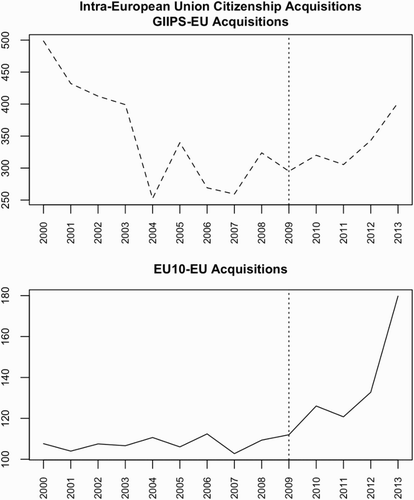
Demarcated by growing austerity, economic uncertainty, and EU-exits, the past decade witnessed monumental shifts across the political and economic landscapes of Europe. Citizenship is a stabilising force in this era of crisis, particularly for intra-EU migrants. In this contribution, I examine how the Euro crisis impacted citizenship acquisition among these migrants. Building upon the model proposed by John Graeber’s article, I discuss the relative importance of citizenship in times of crisis from global and regional perspectives. I argue Graeber’s theory presents a strong model for citizenship acquisitions during the crisis, yet leaves the core dyadic structure and several inconsistent findings unexamined. I replicate these models and introduce a dyadic model using bilateral data from 21 receiving and 23 sending states in Europe between 2007 and 2013. Contrary to Graeber’s theory, I find citizenship acquisitions among intra-EU migrants primarily coincide with increased in-migration, rather than influences of the Euro crisis. I conclude that while economic sending and receiving contexts matter, the Euro crisis did not appear to restructure intra-EU migrant citizenship incentives.
1. Dual citizenship policy and migration flow: An origin story. (with S. W. Goodman). 2017. Comparative Political Studies.
Article Link. Abstract ↓
⚬ Covered in:
• Quartz
⚬ Referenced in:
• Swiss Federal Migration Commission Report
• European Union Institute Forum
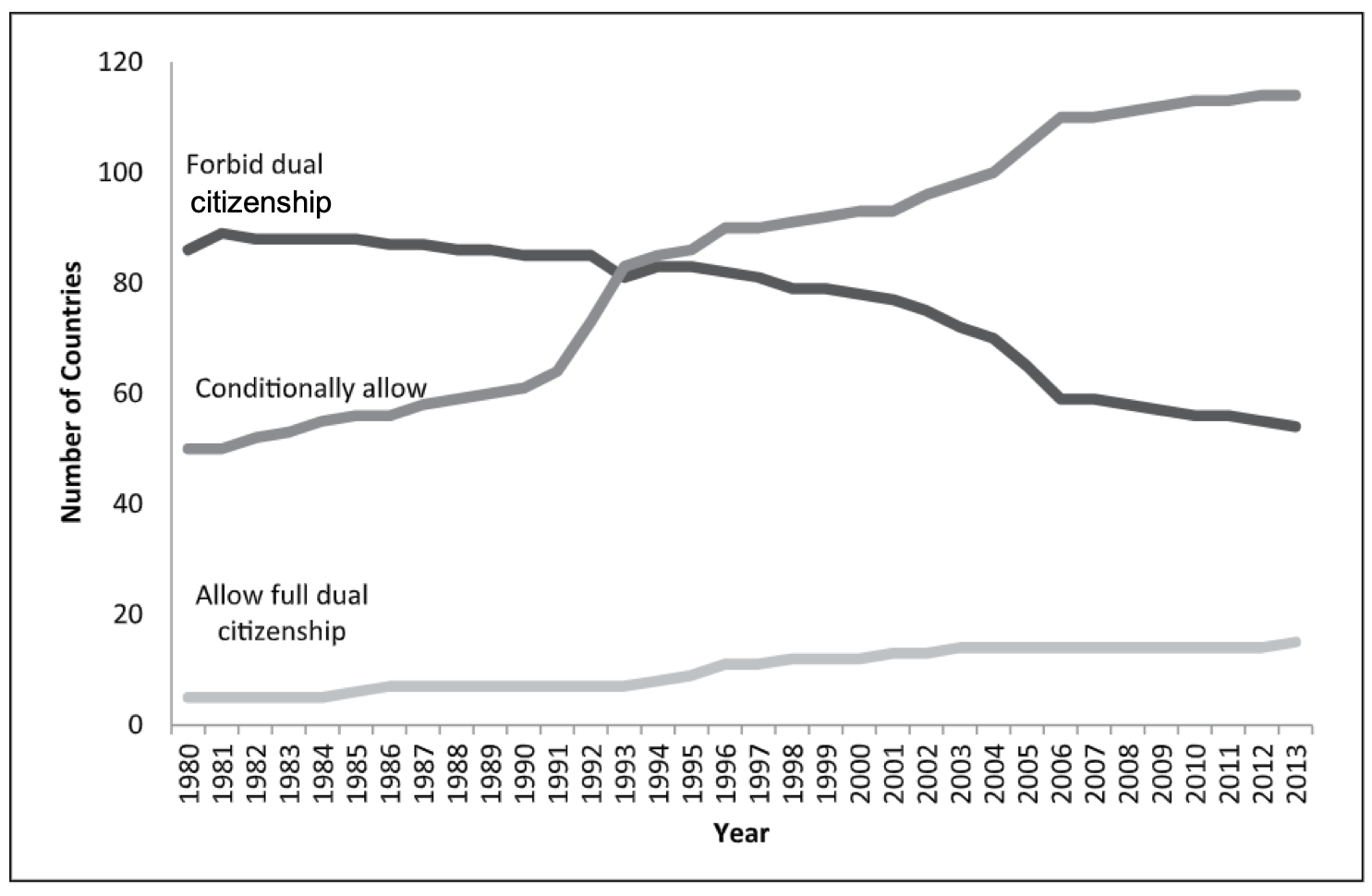
What effect does variation in dual citizenship policies of both sending and receiving societies have on bilateral migration flow? Employing a modified gravity model, we use a new dual citizenship database to examine the effects of allowance within 14 Organisation for Economic Co-Operation and Development (OECD) receiving states and more than 100 sending states between 1980 and 2006. We show that dual-citizenship-allowing sending states experience significantly more migration than dual-citizenship-forbidding sending states. We also find a significant increase in migration flow in receiving states that allow for dual citizenship, consistent with previous research. Finally, interaction effects reveal highest flow between sending and receiving states allowing dual citizenship and lowest flow between forbidding sending states and allowing receiving states. These findings emphasize the importance of citizenship policy contexts of countries of origin in influencing a migrant’s decision to move. They also suggest that migrants are rational and informed, valuing the “goods” of citizenship—from political rights to security of status and mobility—in both origin and destination states.
Book Chapters
3. Populism and Prejudice: The Normalization of Anti-Immigration Attitudes in Germany. 2024. In Still the Age of Populism? ed.s A. Kreppel, M. Bernhard, and C. de la Torre.
Chapter Link. Chapter. Abstract ↓
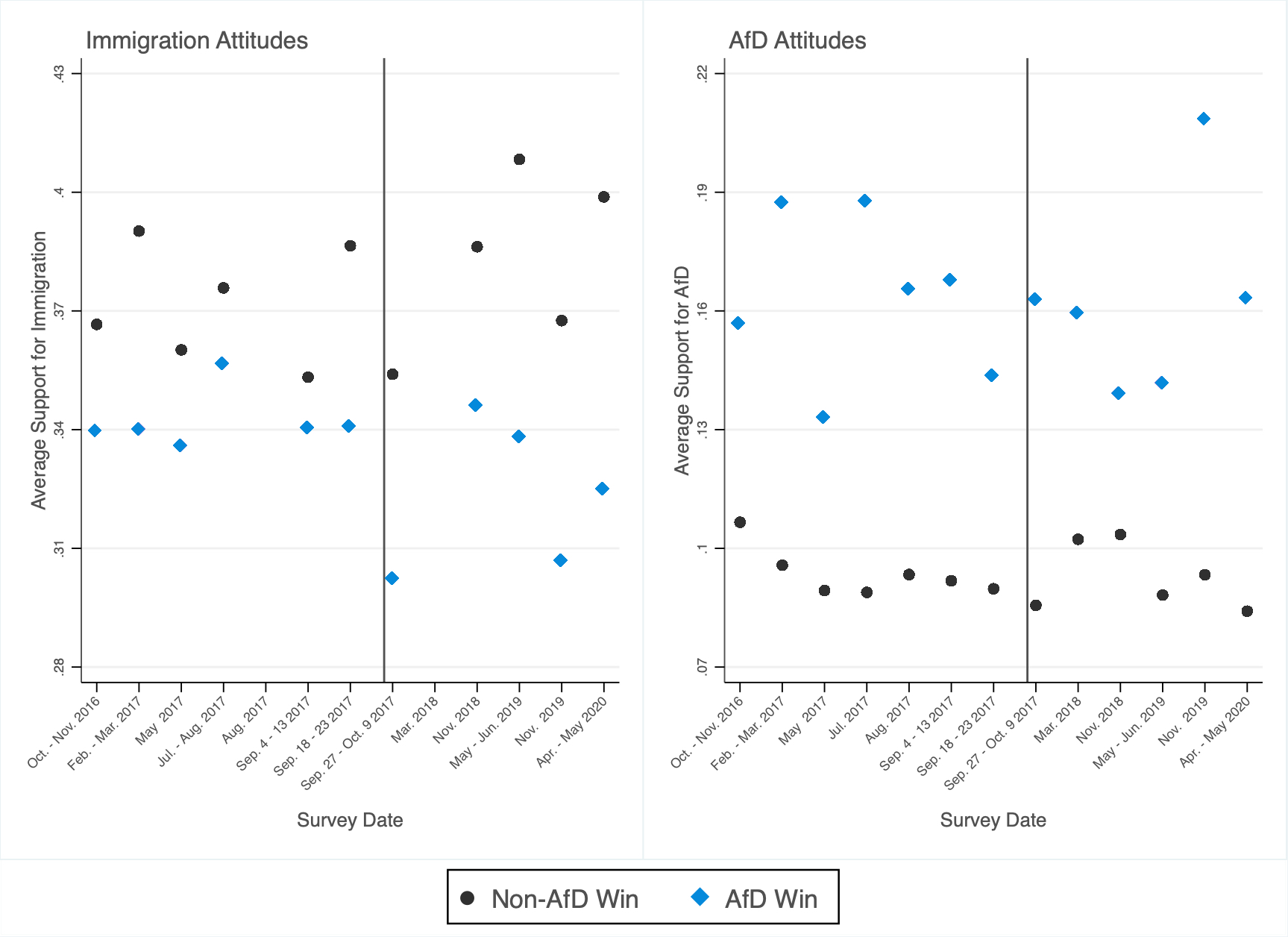
What is the lasting impact of populism on public opinion? Far-right populist wins have been shown to specifically increase anti-immigration sentiment immediately after the election yet little is known as to whether these effects are ephemeral or enduring. This chapter specifically addresses this question, unpacking the lasting effect of far-right populist wins on attitudes public opinion toward immigration and populist parties themselves. Using the recent parliamentary entry of the Alternative für Deutschland (AfD) in Germany, I find the party’s win significantly reduced support for immigration. Moreover, this effect appears to persist beyond three years since the AfD’s first successful election. In sum, this chapter reveals that although voters do not appear to become populist supporters themselves, they nevertheless move to endorse populist policies after a populist win. This chapter concludes that prejudice appears as a lasting legacy of populist success. Thus regardless of the parties’ future performance, democracies must directly address the anti-immigrant sentiment left in populism’s wake.
2. Immigration in the 2021 German National Election. (with J. Fahey) (2023). In The German Federal Election 2021. New Perspectives in German Politics ed.s R. Campbell & L.K. Davidson-Schmich.
Chapter Link. Abstract ↓
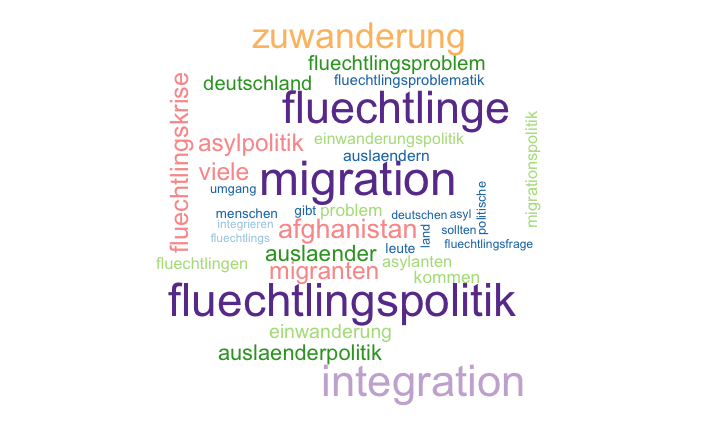
Immigration has historically played a crucial role in understanding voter and party behaviour in Germany. Whether immigration remains relevant in understanding German political behaviour is yet to be seen. The contested issue environment of 2020 speicifically may have changed the way German parties and voters consider the issue. We address this question in this contribution, using text-as-data approaches to examine how German voters, parties, and the incoming coalition spoke about immigration in the 2021 election. By analysing electoral manifestos of six political parties, we show that immigration remained an oft discussed and critical issue for many parties. Further, we show that significant variation exists in whether individual parties primarily discussed immigrants as refugees, members of specific origin groups, or through their legality status. Turning to voters, we find that immigration concerned voters with different party loyalties consider immigration in distinct ways, suggesting immigration voters may be influenced by party-level depiction of immigration. Together, we conclude immigration remains a nuanced yet critically important issue in contemporary German politics.
1. Immigrant Economic Rights and Institutional Inclusion in the European Union. (2023).
In Re-Examining the Citizenship Integration Nexus ed.s L. Pedroza, S. W. Goodman, & R. Barbulescu.
Open Access. Chapter Link. Abstract ↓
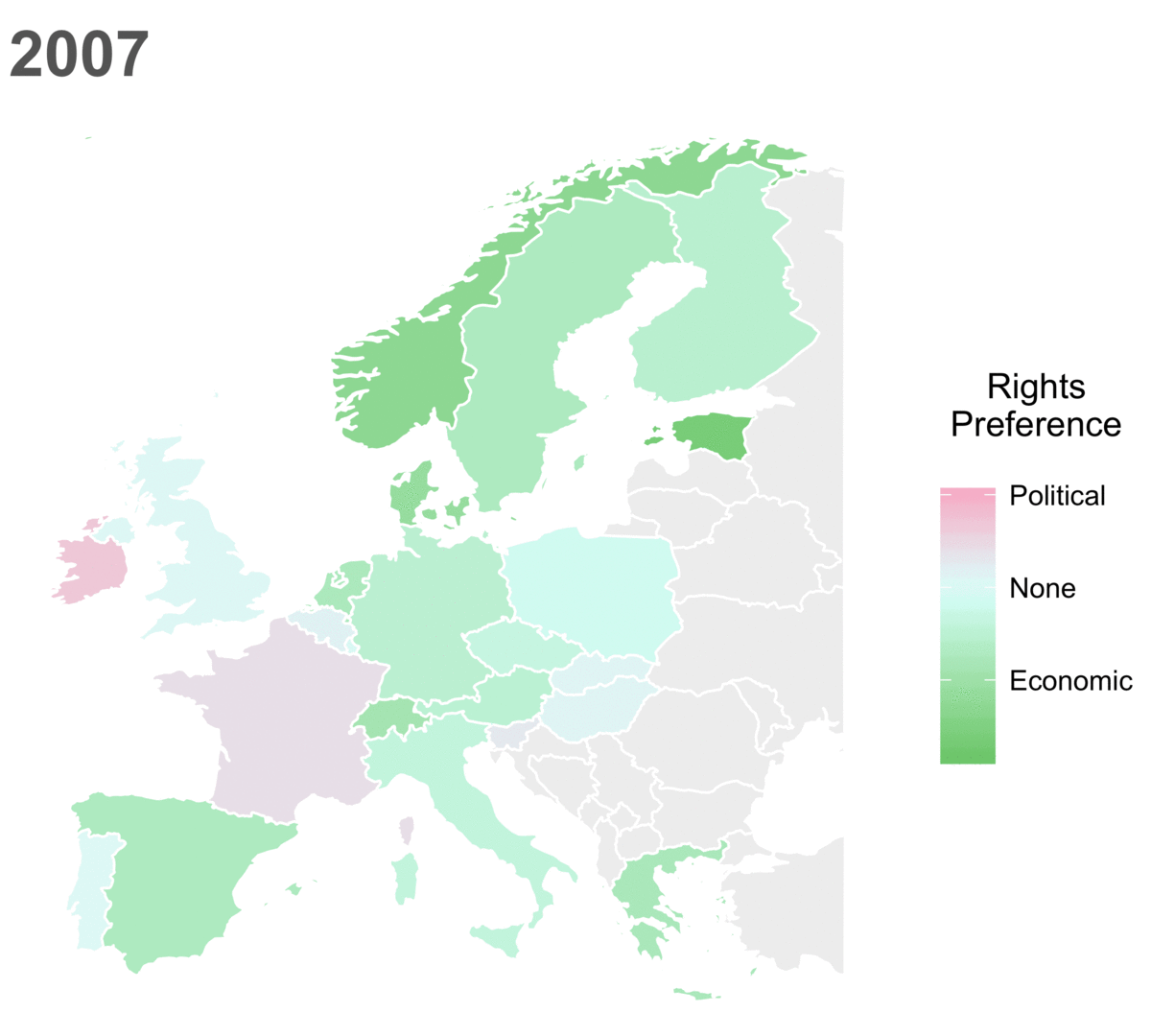
This chapter asks how immigrant access to economic rights in the European Union affects third country immigrant inclusion. I take this inclusion seriously as a dyadic process, shaped both by individual and institutional commitments. This allows for a holistic and nuanced portrait of the interaction between societal inclusion and economic rights below citizenship. I find evidence that equal access to employment opportunities improves immigrant quality of political and social life within the EU. Specifically, non-EU immigrants are more likely to be happier, more satisfied with democracy, government, and one’s life overall when provided with access to the labour market. Further, I show that citizenship - a formal marker of inclusion - also increases when welfare assistance is not directly penalized. As EU member states vary in their relationship between granting economic rights, I conclude EU member states committed to immigrant inclusion should remove barriers to rights.
Select Work in Progress
Immigration in the 2025 German Elections: Party Positions and Voter Perceptions (with P. Capes-Davis).
Working Paper available upon request. Abstract ↓

This article traces how immigration––one of the most contentious and enduring issues in German politics––shaped the 2025 election. Beginning with the collapse of the Ampel coalition, we map party platforms and voter perceptions in Germany’s 21st Federal Election. Among parties, we find sharp divisions in campaign platforms: the right conversed on restriction while the left remained broadly, yet unevenly, inclusive. For voters, immigration salience remained high and increasingly aligned with right-wing positions. Using GLES (2025) public opinion data, we find that voters clearly perceived the restrictive cues on the right but relied on party legacies—not programmatic nuance—to place parties on the left. Amid these patterns, the 2025 coalition government’s increasingly restrictive policies risk further entrenching immigration as the central axis of political competition.
National Pride and Prejudice: Highlighting Immigrant Contributions to Key Institutions Reduces Xenophobia (with A. Rosenberg).
EGAP. Abstract ↓
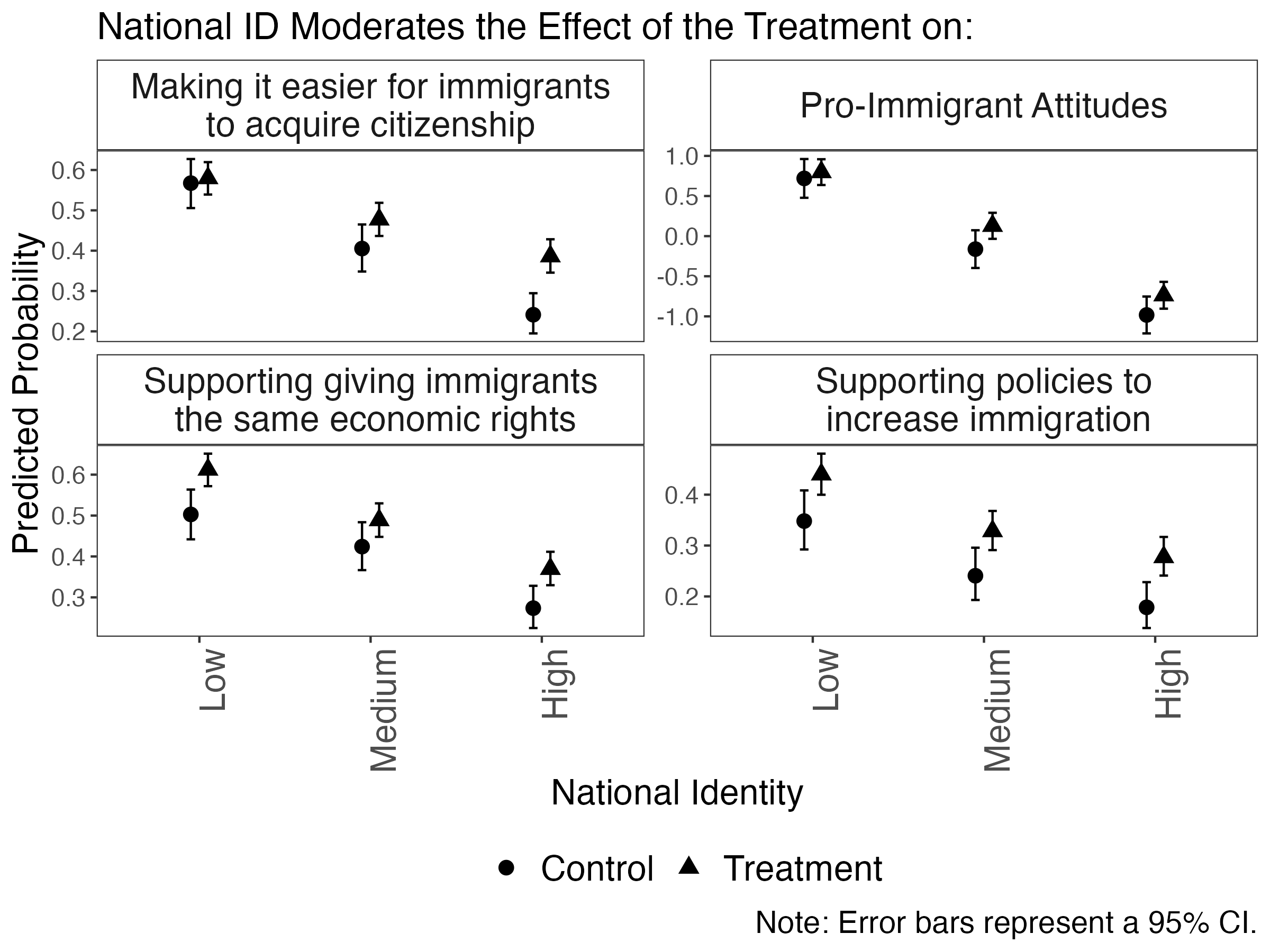
Anti-immigrant prejudice is a global concern, most pronounced among individuals with strong national identities. This study revisits this dynamic by examining whether activating the national identity can mitigate such prejudice. Specifically, it explores the impact of associating immigration with institutions integral to national identity on reducing anti-immigrant sentiment, particularly among strong national identifiers. Using evidence from two survey experiments of citizens of the United Kingdom, we demonstrate that emphasizing the importance of immigrant labor to the National
Health Service (NHS) significantly lowers support for anti-immigrant policies and attitudes. This effect is notably stronger among those with the strongest national identities and is consistent across portrayals of immigrants as either high- or low-wage workers. Crucially, this relationship is exclusive to the context of the NHS, not extending to the private healthcare sector. These findings underscore the potential of highlighting immigration’s contributions to national institutions as a strategy to alleviate anti-immigrant prejudice in the Global North.
The "Right'' Migrants: Explaining Immigrant Support for Far-Right Nativist Parties. (with J. Fahey)
Abstract ↓
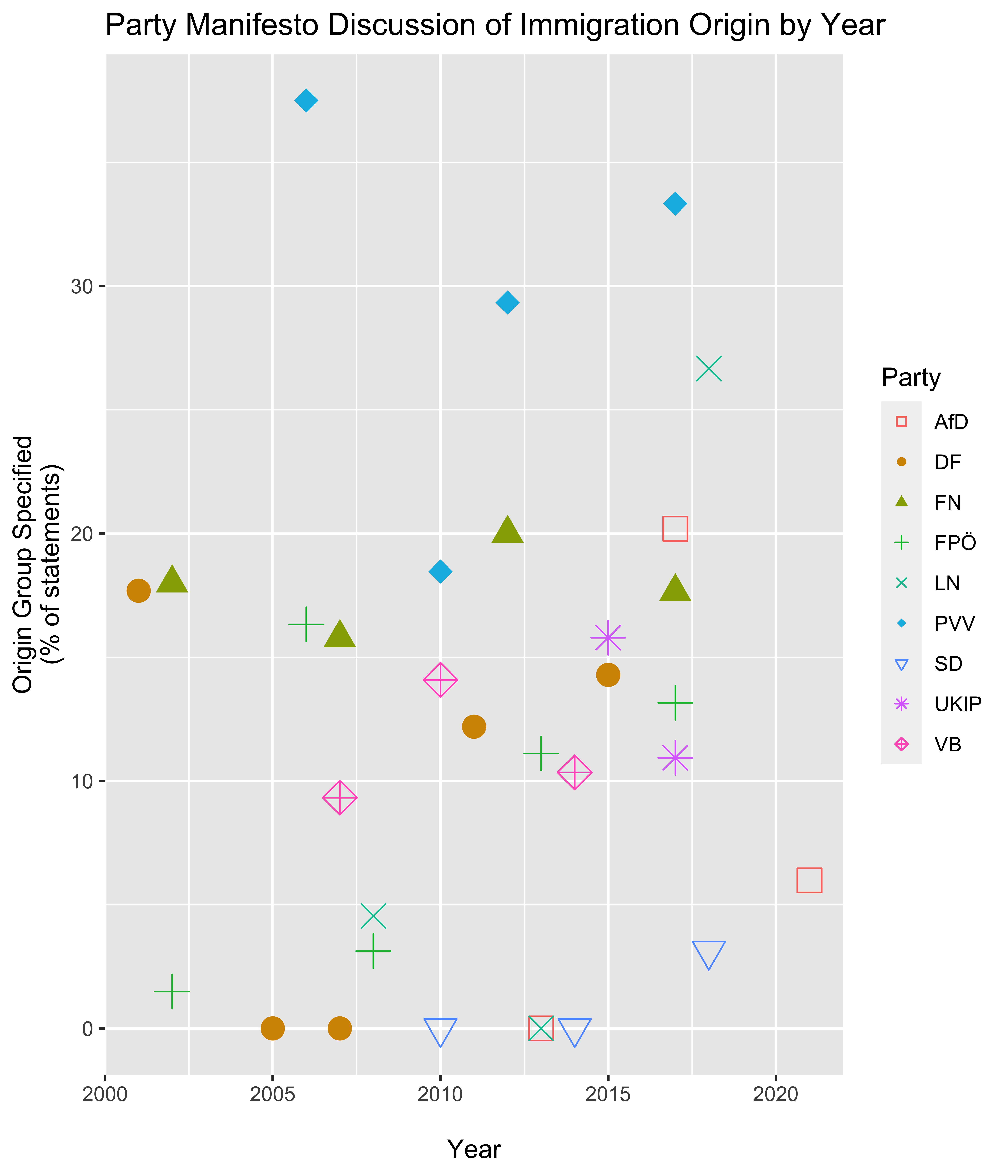
Far-right nativist parties (FRNPs) are staunchly anti-immigrant, drawing their support from citizens with anti-immigrant attitudes. Despite their virulent nativist rhetoric, FRNPs still obtain considerable support from immigrant voters. We address this puzzle, arguing that FRNPs attract immigrant background voters through the strategic disaggregation of immigration by origin (as opposed to general opposition) within party rhetoric. We test this using a novel data set of hand-coded party manifestos coupled with individual European Social Survey Data from 2002-2019. We find that both immigrant background and citizen voters are significantly more likely to vote for FRNPs using origin-based distinctions. This pattern is unique to origin distinctions, as compared to those based on humanitarian status, legality, or Muslim origin alone. The behavior of center-right parties further does not constrain far-right voting behavior. These findings add to our understanding of how FRNPs can expand their electorate among unexpected populations in Western Europe.
Traces of the Past: Regime Histories and Anti-Foreigner Violence in Post-Unification Germany. (with M. Bernhard & A. Rosenberg).
Abstract ↓
⚬ Best Paper Award from the APSA European Politics and Society Section 2025
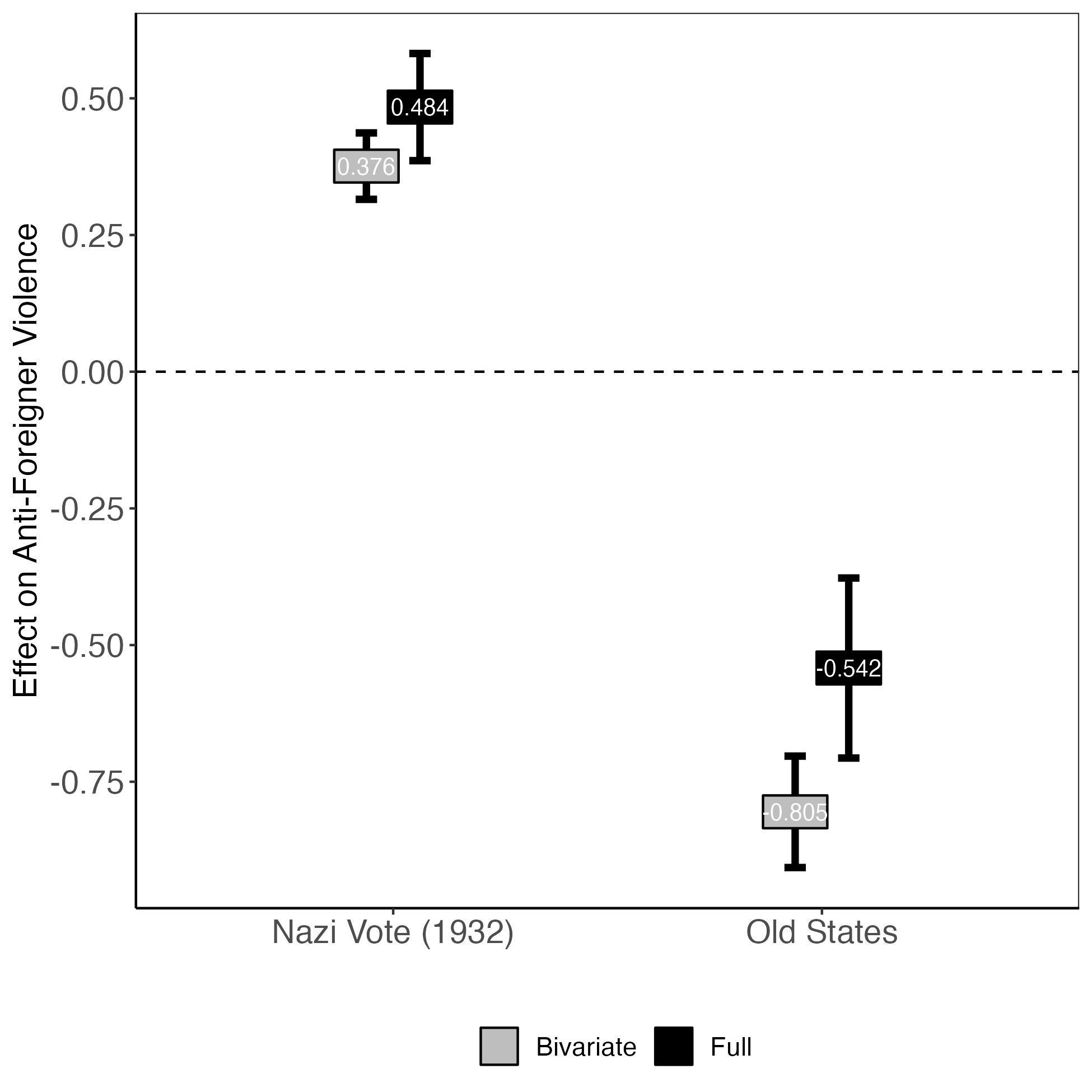
Anti-foreigner violence is a pressing problem in European democracies. Most interventions look to contemporaneous solutions to reduce or stigmatize such violence. Yet this focus fails to consider how historical legacies continue to shape the persistence and geographic contours of violence. We address this possibility, theorizing that divergent memory politics, reconciling with Nazism’s violent legacies, influence current anti-foreigner violence. Using novel anti-foreigner violence data between 1992 and 2021, we reveal that past Nazi support remains associated with violence toward foreigners in post-unification Germany. Moreover, we demonstrate that memory politics can mitigate this violent legacy. The evolution of a culture of contrition in the former Federal Republic specifically diminished the frequency of attacks on foreigners, in contrast to the former German Democratic Republic, where the social roots of Nazi-era hatred remained unconfronted. State-level memorial and individual survey data corroborate these relationships, revealing that memory politics can blunt the impact of violent legacies.
Voting for Extremists. How Extremist Protests Influence Far-Right Voting Behavior in Germany. (with A. Rosenberg & S. Elischer).
Abstract ↓

The far-right Alternative für Deutschland (AfD) is a prominent force in contemporary German politics: risking social solidarity, increasing anti-democratic attitudes, and advancing exclusionary policies. Despite mass protests and demonstrations across the country against the party since 2017, approximately one in every five German voters currently state they intend to vote for the party in the next federal election. In this article, we examine the proximity of the AfD to right-wing extremist civil society and the impact of right-wing extremist civil society protests on the party’s electoral performance. Using a novel social network dataset, we show that the AfD has become significantly more entrenched within Germany’s right-wing extremist civil society. We further show that protest by right-wing civil society actors with AfD participation significantly increases the party’s vote share. The findings contribute to the ongoing debate in political science about the role of movements on political parties as they demonstrate that opening the AfD to extremist civil society elements increases its vote share.
